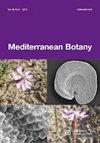Classification of the Sardinian pine woodlands
IF 0.7
4区 生物学
Q3 PLANT SCIENCES
引用次数: 1
Abstract
Mediterranean pine woodlands are one of the most common wooded vegetation types across the Mediterranean Basin and are included in two habitats of European interest as they have great conservation importance. We studied the woodlands of the class Pinetea halepensis dominated by Pinus halepensis, P. pinaster, and P. pinea in Sardinia (Italy) with the aim to clarify their syntaxonomic position. We compiled a dataset of 66 original vegetation relevés, complemented with the holotypes of similar vegetation types formerly described for Italy and Corsica (France). We classified P. halepensis woodlands, native to the Island of San Pietro, to the association Erico arboreae-Pinetum halepensis. We classified P. halepensis woodlands growing on limestones of the south-western coast of Sardinia to the new association Smilaco asperae-Pinetum halepensis and woodlands typical of coastal dunes to the new association Asparago horridi-Pinetum halepensis. We also described the north-eastern Sardinia P. pinaster woodlands as the new association Arbuto unedonis-Pinetum pinastri, of which we recognised two new subassociations, typicum and cephalantheretosum longifoliae, ecologically distinguished by the xerophilous and mesophilous conditions, respectively. Furthermore, we classified P. pinea woodlands, putatively native only to stabilised sand dunes of south-western Sardinia, in the new association Querco calliprini-Pinetum pineae. This study represents the first complete survey and classification of Sardinian pine woodlands, allowing a better understanding of their ecology, floristic composition and differences with other Mediterranean pine woodlands.撒丁岛松林的分类
地中海松林是地中海盆地最常见的木林植被类型之一,由于具有重要的保护意义,地中海松林被包括在欧洲的两个栖息地中。本文对意大利撒丁岛以halepensis、P. pinaster和P. pinea为优势种的halepensis纲林地进行了研究,目的是明确其分类学地位。我们编制了66个原始植被相关的数据集,并补充了以前在意大利和科西嘉(法国)描述的类似植被类型的全模。我们将原产于圣彼得罗岛的halepensis林地归为Erico arboreae-Pinetum halepensis协会。我们将撒丁岛西南海岸石灰岩上生长的halepensis林地划分为新类群:细杨木- haleppinetum,海岸带沙丘林地划分为新类群:Asparago verdii - haleppinetum。我们还将撒丁岛东北部的pinaster林地描述为新类群Arbuto unedonis-Pinetum pinastri,其中我们识别出两个新的亚类群,典型亚类群和长叶亚类群cephalaneretosum longifoliae,分别以干旱和中温环境为生态特征。此外,我们将原产于撒丁岛西南部稳定沙丘的松果林(P. pinea)归为新类群Querco calliprini-Pinetum pineae。该研究首次对撒丁岛松林进行了完整的调查和分类,使人们能够更好地了解撒丁岛松林的生态、植物区系组成及其与其他地中海松林的差异。
本文章由计算机程序翻译,如有差异,请以英文原文为准。
求助全文
约1分钟内获得全文
求助全文
来源期刊

Mediterranean Botany
Agricultural and Biological Sciences-Plant Science
CiteScore
2.40
自引率
10.00%
发文量
30
审稿时长
12 weeks
期刊介绍:
Mediterranean Botany (ISSNe 2603-9109), formerly Lazaroa, is a biannual journal that publishes original research studies in the field of Botany including plant systematics, vegetation ecology, biogeography, evolutionary biology, ecophysiology, community ecology, ethnobotany and conservation biology on Mediterranean biomes but also in interacting areas.
Mediterranean Botany is an OPEN ACCESS Journal, free of charges for any published article.
 求助内容:
求助内容: 应助结果提醒方式:
应助结果提醒方式:


